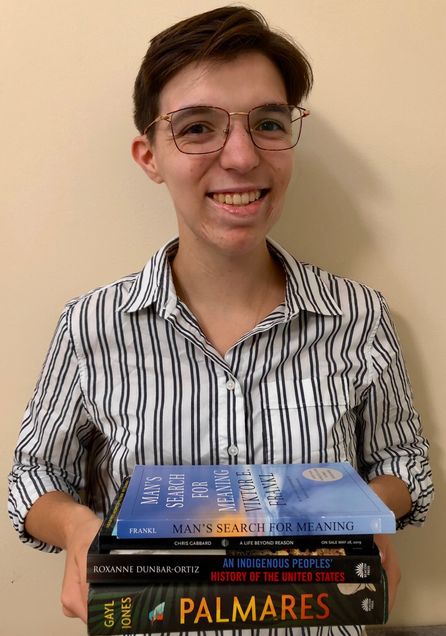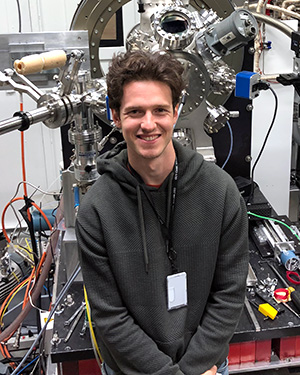This article, by Steve Holt, originally appeared in arts&sciences on September 14, 2022
From book publishing to ion bombardment, CAS undergrads are gaining valuable experience and exploring new frontiers
This article, by Steve Holt, originally appeared in arts&sciences on September 14, 2022
From book publishing to ion bombardment, CAS undergrads are gaining valuable experience and exploring new frontiers
“While internships facilitate the transition of knowledge and skills from school to work, they also allow you to observe different work roles and styles,” says May Perriello, who coordinates BU’s Yawkey Foundation Nonprofit Internship Program. Interns are immersed for a time in what could be their future profession, where they can see both the good and the bad, she says. “Learning what you don’t like at an internship is equally important as learning what you do like.”
arts&sciences caught up with three CAS undergraduates—Baker; Kasandra Kue-Rojas (’24), a junior majoring in anthropology with a specialization in health and medicine; and Kathryn Lakin (’25), an English major—to talk about what they’re doing this summer.
Kasandra Kue-Rojas

Kue-Rojas says she “fell in love with anthropology” in an Introduction to Medical Anthropology class her first year and changed her major from biology to anthropology. She picked the health and medicine track, which was rolled out in fall 2021, and would like to become an advocate for healthcare staff and doctors who are too often undervalued, sidelined, or facing difficult work environments.
So, when the Providence, R.I., native learned about a summer internship interviewing Boston-area hospitality and senior care workers and managers hard-hit by the pandemic, she immediately recognized the overlap with her own interests and jumped on the opportunity to apply. Kue-Rojas is one of two Faculty Pilot Grant Research Assistants, funded through the Center for Innovation in Social Science, working with Makarand Mody, director of research and associate professor of hospitality marketing at the BU School of Hospitality Administration, on a project investigating the strategies workers in precarious service jobs develop to remain safe and flourish.
She has been meeting with hospitality workers like restaurant managers, dishwashers, and hotel housekeeping staff to find out about the challenges they’ve faced at work and strategies they’ve used to overcome them. She asks them to reflect on their childhoods and work histories, what success means to them, and how they could feel more supported by their communities. Besides picking up valuable interviewing skills that she’ll use as an anthropologist or social worker, Kue-Rojas says she identifies with many of those she’s interviewed because she comes from an immigrant family (Dominican and Hmong) and has worked in restaurants.
“I can relate to a lot of the struggles,” she says. “That’s the job that I’ve known the most leading up to my career as a student. And being a [person of color] and a first-gen [college student], having the opportunity to do research has always been a passion of mine.”
Kathryn Lakin

Kathryn Lakin has always been a voracious reader. The Charleston, W.Va., native remembers her mother taking her to their local library and limiting the number of books she could check out to 10. If mom didn’t set some limits, young Kathryn would have walked away with several bags full of stories.
Fast-forward to this summer, Lakin is getting a glimpse of how the books she devours are produced. In an internship funded by BU’s Center for Humanities, Lakin is getting a taste of how new books at Beacon Press in Boston are both edited and publicized. In her editorial rotation, Lakin has been reviewing book proposals from potential authors and writing reports for her editors on the most engaging submission. She even wrote a discussion guide for an upcoming book, On Repentance and Repair: Making Amends in an Unapologetic World, by Danya Ruttenberg, due out in September.
“It was just very cool to know that something that I wrote is going to be read by all of these people and used for discussions,” she says.
Lakin says she’s read articles and listened to podcasts about book publishing, but nothing replaces the hands-on experience she’s getting at Beacon. “Being in the office and seeing exactly what people do is very different from just looking at the entire industry as an outsider,” she says. “You start to see why things work the way they work and who exactly is in charge of which pieces.”
Is Lakin as jazzed about going into publishing now as when she started at Beacon?
“Based off of what I’ve done so far,” she says, “I could really picture myself going to publishing.”
Neil Baker

Neil Baker never imagined he’d be spending the majority of his waking hours shooting beams of ions at polymers and observing the nanopatterns they make on the material’s surface. But when Baker approached Karl Ludwig, professor of physics and materials science and engineering, and said he was interested in getting some research experience to beef up his graduate program applications, his professor and adviser invited the junior to join his project team studying novel approaches to ion beam nanopatterning.
“I was thrown in the deep end,” says Baker, who is double-majoring in physics and piano performance. “It wasn’t something I was previously interested in, but it is something I’m interested in now, which is really kind of cool.”
When a material is bombarded with ions, microscopic patterns, left on the material’s surface, can be useful in certain products and industries. The types of patterns—such as ripples, holes, or jagged peaks—are influenced by factors including the type of ion, the angle at which its traveling, and the ion energy. While past experiments have used silicon, the Sydney, Australia, native—the sole BU undergrad on a research team working under Ludwig—works primarily with polymers, an umbrella term for a class of materials whose molecular structures are composed of long chains of similar units. Polymers are present in products from clothing to garbage bags. Baker’s research has implications for commercial use. For instance, could ion bombardment be used to create the microscopic holes in filtration systems that strip water of bacteria or toxins?
“Our overall objective would be to find a way to cheaply and efficiently produce materials with surface patterns that can be used in [industry] applications,” Baker says. “Not a ton has been done in this field, so we are definitely on the frontier. We’re pushing some boundaries, and that’s pretty exciting.”
Baker’s position is funded through the Undergraduate Research Opportunities Program (UROP), with a matching grant from Ludwig’s group. Under Ludwig’s mentorship, Baker spends 40 hours a week in the professor’s lab and will present his findings at the 25th Annual Undergraduate Research Symposium in October. The ion bombardment research has even brought Baker and his fellow researchers to Brookhaven National Laboratory to use the giant synchrotron, which uses X-rays to provide a more complex picture of how ions transform various materials. The work is “more slow going and less glamorous” than Baker imagined, but he says it’s made him more patient and methodical—essential traits for complex physics experiments where advances are measured on the nanoscale.
Should he not continue in physics, Baker could pursue his other passion, music. He’s even written a musical based on the COVID-19 pandemic, parts of which he’s entered in musical theater writing contests. But Baker says his ion research sets him up to continue in academia or work in industry. Computer science is another possibility.
“I’m manipulating this math and looking at data using computer programming languages like Python,” Baker says. “If you go down Comm Ave and you see the new Center for Computer and Data Sciences building, it’s a big field and a lot of people are majoring in computer science. Having those sorts of skills, which I’m also developing in this lab, will contribute greatly to whatever I decide to do.”